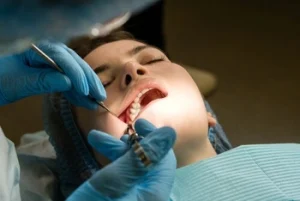Maintaining your mouth might seem simple, but knowing how to improve oral hygiene is one question that can have a notable impact on long-term health. Many people brush daily but overlook the habits that truly protect their teeth and gums. Your mouth is closely connected to your overall health, and even small changes in your routine can prevent discomfort later on. When patients ask about ways to strengthen their teeth or avoid decay, the answer usually starts with consistent daily care. Let’s look at practical steps that support lasting good oral hygiene and help you maintain comfort and confidence every day.
Understanding What Good Oral Hygiene Really Means
Strong oral care matters because it prevents tooth decay and gum problems before they start. Oral care plays a central role in maintaining balance across your body, supporting both health and confidence every day.
How Oral Hygiene Affects Your Whole Body
 Your mouth plays a crucial role in your body’s balance. Research shows that bacteria from poor oral hygiene can travel through the bloodstream and increase the risk of heart disease and other health conditions. Regular cleaning and balanced nutrition keep good oral health aligned with your overall health. Neglecting care can cause oral health problems that extend beyond your mouth, affecting how you eat, speak, and feel daily. A well-maintained mouth helps regulate the body’s natural defences, reducing inflammation that can strain vital organs. Paying attention to your oral care means you’re also supporting long-term strength and stability throughout your system.
Your mouth plays a crucial role in your body’s balance. Research shows that bacteria from poor oral hygiene can travel through the bloodstream and increase the risk of heart disease and other health conditions. Regular cleaning and balanced nutrition keep good oral health aligned with your overall health. Neglecting care can cause oral health problems that extend beyond your mouth, affecting how you eat, speak, and feel daily. A well-maintained mouth helps regulate the body’s natural defences, reducing inflammation that can strain vital organs. Paying attention to your oral care means you’re also supporting long-term strength and stability throughout your system.
The Importance of Daily Consistency
Small, steady actions create meaningful change. When you brush your teeth twice a day, you remove food particles that contribute to dental plaque and irritation along the gum line. Pairing daily brushing with dental floss or a water flosser keeps hidden areas clean. Consistency prevents plaque buildup, which can lead to tooth decay, bleeding gums, or even gum recession. Regular effort at home builds a protective foundation that lasts.
Recognising the Early Signs of Trouble
Changes like bad breath, redness, or swelling could signal the start of a mild form of gum disease. Without attention, it can progress into a severe form that causes loose teeth or tooth loss. You might also experience dry mouth, which increases the chance of tooth decay because saliva helps remove plaque naturally. Spotting issues early lets your dentist manage them before they lead to other oral health problems.
Daily Habits That Strengthen Your Teeth and Gums
Strong hygiene habits support your mouth’s natural defences. Building a steady oral hygiene routine reduces bacteria, strengthens enamel, and keeps gums healthy over time.
 Brushing Correctly and Regularly
Brushing Correctly and Regularly
Brushing may seem simple, but how you do it makes all the difference. Use a soft-bristled toothbrush or one with soft bristles to protect tooth enamel. Move the brush in gentle circular motions, angling slightly toward the gum line. Brush your teeth regularly, ideally twice a day, using fluoride toothpaste to shield against decay. By hardening the surface of enamel, fluoride limits bacterial damage and helps your mouth stay resilient against everyday wear.
Flossing and Cleaning Between Teeth
A complete oral care routine always includes cleaning between your teeth to remove what brushing can’t reach. Slide the floss gently between teeth, wrapping it around your middle finger for better control. Sweep the floss up and down against each tooth to dislodge residue and keep those tight spaces fresh and clean.
If traditional floss feels difficult, try a water flosser to reach tight spaces comfortably. Together, brushing and flossing limit bacteria growth and help you maintain healthy teeth.
Staying Mindful of What You Eat and Drink
Diet directly affects your mouth’s condition. Sugary drinks and frequent snacking feed bacteria that cause decay and gum disease. A healthy diet rich in calcium, vitamins, and minerals strengthens teeth and keeps gums healthy. Choose fluoridated water or plain drinking water to wash away residue after meals. Reducing sugar intake supports enamel and lowers the risk of tooth loss later in life.
Protecting Against Hidden Risks
Poor habits can have unexpected consequences. For pregnant women, maintaining proper oral care is especially important, as research has linked poor hygiene to complications such as low birth weight in babies. For others, untreated decay may lead to oral cancer or infections that affect eating and speech. Taking time to clean thoroughly helps you avoid conditions that could impact your comfort and appearance. Maintaining good oral hygiene also helps prevent sensitivity and long-term damage that often go unnoticed until symptoms appear.
Professional Support for a Healthier Mouth
Seeing your dentist isn’t only for emergencies. Professional advice and treatment strengthen what you do at home and help prevent hidden issues before they grow.
The Role of Regular Dental Visits
Routine appointments allow early detection of developing concerns. During regular dental visits, your dentist can remove hardened deposits and check for early signs of gum disease or decay. Visiting a dental professional helps you understand the state of your teeth and gums and how to improve their condition. When you visit your dentist, they can suggest treatments or lifestyle adjustments to keep your gums healthy and your teeth strong.
 Preventive Treatments and Guidance
Preventive Treatments and Guidance
Dentists often provide treatments that reinforce your efforts at home. A fluoride treatment strengthens enamel and helps prevent tooth decay. Professional polishing removes deposits missed during brushing, and early intervention stops minor problems from worsening. A dentist can also recommend tools suited to your needs, ensuring your home care aligns with professional standards. Seeing your dentist regularly means problems are caught before they affect your confidence or comfort.
Long-Term Maintenance for Lasting Results
Maintaining good oral hygiene isn’t a one-time effort; it’s a continuous process. Combining professional care with home routines ensures balance. Polishing, scaling, and advice from your dentist prevent plaque and tartar accumulation that home tools can’t remove. Taking these steps supports both your oral health and your overall health. Patients who stay consistent experience fewer complications and improved comfort, keeping their smiles healthy over the years.
Taking Charge of Your Oral Health for Life
Improving your oral care habits doesn’t require major changes; just consistency and awareness. From proper brushing to smart diet choices, every step contributes to a cleaner, stronger mouth. Following simple oral health tips also helps support your general health, linking daily habits with your body’s overall balance. Visiting your dentist for check-ups completes that protection, ensuring you stay ahead of potential issues.
Maintaining oral health protects your comfort, appearance, and confidence. Whether you need help managing plaque or advice on new products, professional guidance ensures your care routine stays effective. Staying consistent with these steps keeps your teeth healthy and your mouth in harmony with the rest of your body. If you’re ready to improve your oral health and prevent long-term complications, please call us on (02) 9054 5281 to schedule your visit. Our dental team will guide you toward a healthier, stronger smile for years to come.
References
https://my.clevelandclinic.org/health/treatments/16914-oral-hygiene
https://www.mayoclinic.org/healthy-lifestyle/adult-health/in-depth/dental/art-20047475


 Brushing Correctly and Regularly
Brushing Correctly and Regularly Preventive Treatments and Guidance
Preventive Treatments and Guidance